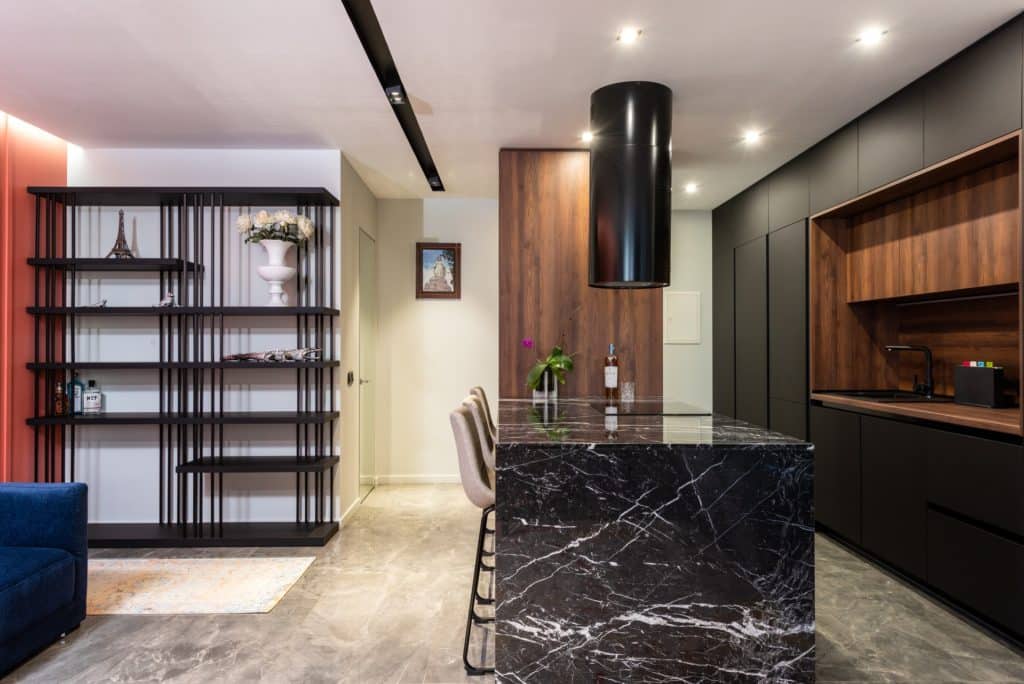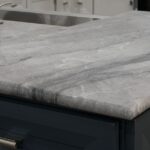Granite is simply an amazing material. It’s everyone’s go-to option when looking for a countertop, and for a very good reason: it makes for one of the most reliable countertop materials. Still, if you’re a bit tired of the usual grainy black-and-gray look, you might want to consider getting black granite countertops.
While granite is usually associated with that classic grainy look, there is granite with every kind of texture. I’m not exaggerating. You can find them in a wide range of colors, and in a wide range of shapes. Some of them don’t even look grainy, but have colorful veins that make them look like quartzite.
That means that you’re able to get the strength of granite with a look that could rival the most expensive stones around. And black granite countertops are a part of it, being able to give your home a unique look.
Interested in learning more about granite countertops? Then check out our definitive guide on granite countertops in order to learn about the main features of this marvelous stone.
The Essentials Of Black Granite Countertops
Granite is this beautiful mess of many different kinds of minerals. The grains you usually see in them aren’t just different colors, but completely different kinds of crystals of rocks, each with their very own composition, tightly locked onto one another thanks to years of heat and pressure.
One of those crystals is biotite. Biotite ranges in color from a dark brown to nearly total black. It’s more noticeable in brown granite, as it gets mixed around and goes towards a lighter shade of its color, as well as the possible presence of other minerals mixed in.
Another important one is amphibole. Similarly to biotite, amphibole tends towards darker shades, but it has a distinguishing green tint, being the most visible mineral in green granite.
When those two crystals are able to get to their greatest possible concentration, not being mixed in too much with other lighter-colored minerals, they end up creating the black granite look.
Black granite countertops come in many shapes and forms. They usually have an amount of other minerals, especially quartz and feldspar, making for the odd white or off-white spot here and there, contributing to the usual granite look.
But, you may also sometimes find black granite that’s almost purely black, featuring a very small concentration of other minerals. While you may recognize it as a kind of granite, some people may not refer to it as granite, as when the concentration of quartz is too low, it’s technically a kind of gabbro.
However, it’ll work just as well as any kind of granite, so they’re still a great option.
Advantages
The main advantages of black granite is that it is a kind of granite, and it looks amazing.
Black granite works anywhere that the usual granite would work. The main difference being that its blacker coloration looks much classier than the standard stock granite texture. It can give a unique look to your home and impress everyone who sees it.
Not only that, but it’s much better at handling stains. Some strong-colored liquids like red wine and coffee can leave a stain on natural stone countertops, especially if the sealer is wearing out. And that stain usually makes the affected region look darker and with a different tint.
However, black granite is already very dark, meaning the stains would be much less noticeable, making it require less maintenance than usual.
And you don’t pay the price for getting a different style. Marble, for example, is a much classier and more well regarded stone, meaning a lot of people tend to pick it to give a unique look to their home. The thing is, marble is very soft, so it requires a lot of maintenance in order to keep its looks.
Black granite, on the other hand, is still a kind of granite. Granite is very famous for its strength, durability and reliability, and black granite is no different. So, it looks great and doesn’t give you a headache in the process.
Disadvantages
Unfortunately, there is something you should consider too. While black granite countertops are much better at handling stains, they aren’t as good at handling stains’ evil brother, the etches.
Etches are the result of a strong or acidic product getting in contact with the stone. Instead of leaving pigments behind, resulting in a darker coloration, those kinds of products react with the stone, leaving a lighter, bleached look. As it’s lighter-colored, it’s much more noticeable on black granite.
While most kinds of stains can be removed from a countertop with some effort, etches can’t, because that chemical reaction is irreversible. In order to remove the bleached look, you’ll have polished the stone again, so it will cost quite a bit.
Still, if you don’t keep strong products over it regularly, nor use them to clean the countertop, you can easily avoid this problem, although it’s a noticeable disadvantage compared to, say, white granite countertops.

Get Only The Best Black Granite Countertops
Looks for high quality black granite countertops? Then you’re in the right place!
If you live in or near Sarasota, FL, be sure to come visit our showroom to see what we have to offer.
If you want, we can also send you one of our specialists for a free estimate.
It’s the easiest way to get a high-quality countertop!



